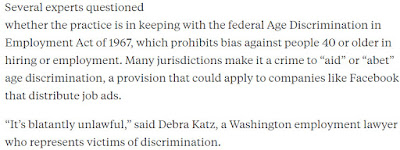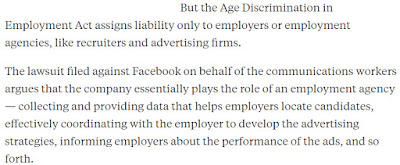In the original piece by ProPublica, Angwin and Larson reported on large firms using targeted Facebook ads to recruit potential employees. That is legal. However, the firms asked Facebook to limit who saw the ads, and to not show the ads to anyone who was too old. That has been declared illegal by the EEOC.
A basic explanation of what this entails:
They use their I/O words to explain precisely what law was broken:
Later in the article:
They explain microtargeting, or how ads can be aimed at specific groups at the exclusion of others:
And microtargeting isn't illegal. That's good business, right? It allows organizations to target the most likely customers. In fact, some of the companies argued that targeting likely hires is just like targeting people most likely to use a given service:
I think this would be a great discussion prompt for students. How is advertising for a job different than advertising for a service or product? What laws protect one but not the other?
As a stats instructor, I also think it is interesting that ProPublica stumbled upon this issue while collecting data on Facebook ad placement and politics. And that was a big, communal data collection conducted with the help of ProPublica readers. Because anyone can be a scientist and help with science, my friends.
 |
| More on that political placement study here: https://www.propublica.org/article/help-us-monitor-political-ads-online |
PS: If you can, support ProPublica. Their investigative reporting is top-notch, in-depth, and considers many different angles. This is not the click-bait reporting we've grown accustomed to. The story I linked above is one of several stories that Propulica has published about this issue.











